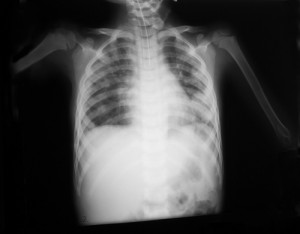 A recent Japanese study proposed that high serum progranulin levels may be used as biomarkers in dermatomyositis and interstitial lung diseases. The study entitled “Serum progranulin levels are elevated in dermatomyositis patients with acute interstitial lung disease, predicting prognosis” was published in the journal Arthritis Research & Therapy by Atsushi Tanaka, first author, and Hiroshi Tsukamoto, senior author, from the Department of Medicine and Biosystemic Science, Kyushu University Graduate School of Medical Sciences, Fukuoka, Japan, and colleagues.
A recent Japanese study proposed that high serum progranulin levels may be used as biomarkers in dermatomyositis and interstitial lung diseases. The study entitled “Serum progranulin levels are elevated in dermatomyositis patients with acute interstitial lung disease, predicting prognosis” was published in the journal Arthritis Research & Therapy by Atsushi Tanaka, first author, and Hiroshi Tsukamoto, senior author, from the Department of Medicine and Biosystemic Science, Kyushu University Graduate School of Medical Sciences, Fukuoka, Japan, and colleagues.
Dermatomyositis (DM) is systemic autoimmune and inflammatory disease that affects the muscle, skin and other organs, like the lungs, heart and joints. Interstitial lung disease (ILD) is the most common internal organ expression, and has an impact on the prognosis of DM patients. ILD can be subdivided in acute/subacute interstitial pneumonia (A/SIP) and chronic interstitial pneumonia (CIP). Acute/subacute interstitial pneumonia is frequently complicated with clinically amyopathic DM (CADM) with the typical skin manifestations of DM but normally does not have clinical myositis, inflammation of the muscles. A/SIP complicated with CADM is serious and has a quick progressive profile. Diagnosis and evaluation of ILD is crucial to define the therapy approach when DM is diagnosed. Even though various biomarkers reflecting lung inflammatory activity have been used there are no recognized serum biomarkers for DM-associated ILD.
Progranulin (PGRN), a pleiotropic growth factor, has been proposed as an immunoregulatory molecule; in particular PGRN from macrophages is an important regulatory factor in the processes of inflammation and wound healing. Since the role of PGRN in dermatomyositis (DM) is not known the research team investigated if serum PGRN levels are associated with disease activity and prognosis in DM patients, mainly in patients with DM complicated with interstitial lung disease (ILD).
[adrotate group=”8″]
The researchers recruited 57 patients with dermatomyositis (DM), 21 patients with polymyositis (PM) and 60 healthy control subjects to perform a cross-sectional study of patients treated at Kyushu University Hospital, Saga University Hospital and Japanese Red Cross Fukuoka Hospital between 2002 and 2013. The majority of the participants were women with an average age of 53 years. Patients with other autoimmune and infectious diseases were excluded.
The researchers found that serum progranulin levels within patients with DM were significantly higher when compared with healthy controls and patients with PM. The average values of progranulin in healthy controls ranged between 35 ng/mL and 70 ng/mL with normal distribution while in patients with DM and PM were, respectively, 109 ng/mL and 60 ng/mL. Within the patients with ILD, the patients with acute or subacute interstitial pneumonia had significantly higher levels of progranulin than patients with chronic interstitial pneumonia and healthy controls. The findings were independent age or sex of the participants.
Overall, high levels of progranulin were associated with disease activity and may be a potential biomarker for the disease in Japan.

